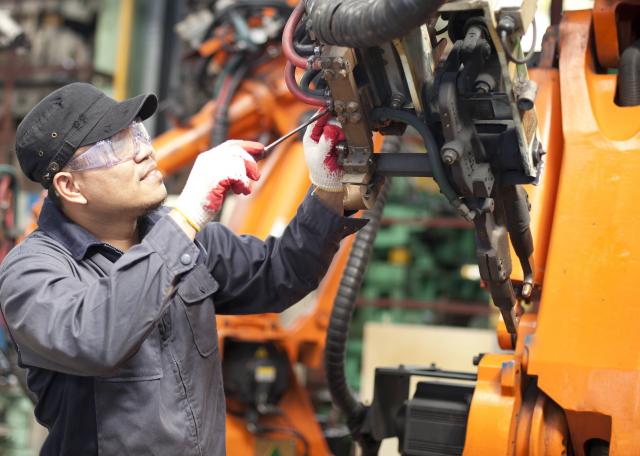Interested in a career with industrial robots?
July 22, 2019By Laura Dugan ’03
Industrial robots perform repetitive, strenuous, or potentially dangerous tasks accurately and efficiently. While primarily introduced within the automotive industry, the use of robots within all industries has been expanding for years. According to the Robotics Industries Association, “35,880 units were shipped in 2018, a 7 percent increase over 2017, with 16,702 shipments to non-automotive companies, up 41 percent. Notable growth came in areas like food and consumer goods (48 percent), plastics and rubber (37 percent), life sciences (31 percent), and electronics (22 percent).”
These statistics show industries beyond automotive are taking note, creating job opportunities with industrial robots in varying fields.
The American Society of Mechanical Engineers reported that the top five robot jobs within manufacturing are drilling and fastening, inspection (cameras/laser scanners), welding, painting and sealing, and collaborative assembly. While the robots will ultimately complete the final tasks, knowledgeable employees are needed to design, test, and continually advance robotic technology.
Robotics Tomorrow writer Michelle Arios highlighted five potential jobs available to those interested in a career with industrial robots:
- Robotics operator:“Robots require constant supervision in the event of a malfunction or a breakdown, and the operator’s job is to watch (and sometimes control) these robots as they perform their day-to-day tasks,” said Arios. One growing area for robotics operators is working with drones, which can be safely used for many tasks that would otherwise be risky for a human to do.
- Software developer or programmer:“As a software developer, you can design programs that will tell a robot how to operate (and perhaps solve common bugs or kinks that occur in the robot’s operation process) … The better the software, the better the robot’s performance will be.” Knowing multiple programming languages will give you a leg up in working with robots.
- Robotics engineering:Robotics engineers oversee every aspect of robot creation, including design, hardware, and software. “If you have ideas for robots that can revolutionize an entire industry or you’ve conceptualized a new application for robots in an industry that has not yet adopted them, becoming a robotics engineer will put you in at the ground level.”
- Robotics sales: If you have a passion for robots and want others to see the benefit they can have across multiple industries, you may want to consider a career in sales. “Robotics companies need qualified salespeople to convince businesses (or individuals) to purchase their products. If you fully understand the merits of these robots and how they work, your job can be pitching their worth to other people.”
- Robotics repair technician:Robots may be very efficient and effective, but they are not infallible. Someone needs to fix industrial robots when they break down. “You’ll be able to work with a whole host of robots that serve different purposes. You’ll become familiar with them from the inside out, and you might come up with a few ideas to improve upon their design. By keeping reports of what works and what doesn’t, you can help shape the future of efficient robotics.”
Want to learn more about mechatronics? Capitol offers bachelor’s programs in both Mechatronics Engineering and Mechatronics and Robotics Engineering Technology. Contact admissions@captechu.edu to learn more.



